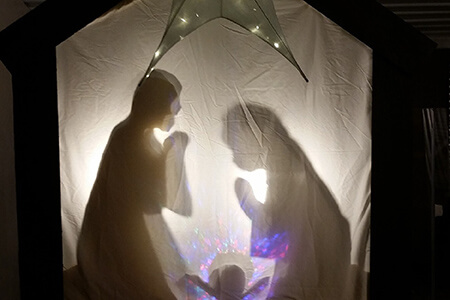 2 Samuel 7:1-5, 8B-12, 14A, 16
2 Samuel 7:1-5, 8B-12, 14A, 16
 Rome 16:25-27
Rome 16:25-27
 Luke 1:26-38
Luke 1:26-38
On this Fourth Sunday of Advent, the last stop before the celebration of the birth of Christ - the ultimate miracle and expression of God’s love - the image of a shelter permeates the wonderful scenes presented in this week’s readings. When we think of a shelter, a few images may come to mind: a tent, a gazebo, a log cabin, a humble cottage, a soup kitchen, a palace, a grand mustard tree, a parent’s or grandparent’s open arms, or perhaps a manger. The image of a shelter evokes strength, confidence, warmth, and most of all, safety. Hikers seek refuge under the green foliage of trees against the pouring rain or burning sun; travellers seek a restful evening at an inn or hotel; refugees desire for a safe haven against persecutions; pilgrims on earth long to rest in the immense love and peace of God. As we journey through Advent, all we can do is to put one foot in front of another, until we reach the ultimate shelter, a lowly manger sheltering a humble family of three. All our darkness, hardships, longing and waiting, culminate in the immense light, comfort, joy, love, and glory of the newborn King.
What is a fitting shelter for our Lord and God; King of kings, and Lord of lords? King David, who may feel a little embarrassed that he, a mere servant of God, lives in luxury while God is relegated to a humble tent, wants to build a proper dwelling for God, “Here I am living in a house of cedar, while the ark of God dwells in a tent” (2 Sam 7:2). While David wants to build a physical dwelling for God, God wants to build something far greater with David.
[God] will establish a house for you [...] I will raise up your heir after you, sprung from your loins, and I will make his kingdom firm. I will be a father to him, and he shall be a son to me. Your house and your kingdom shall endure forever before me; your throne shall stand firm forever.'
(2 Sam 7:11-16)
It turns out that God is a far more superior architect than David! At the same time, how wonderful and mysterious that God chooses to include David in His salvific plan; from David’s house springs forth the eternal King, Prophet, and High Priest (Son of God), and the Kingdom of God will reign over its citizens’ hearts. In truth, our loving God does not need a “cedar house”; rather, we need to dwell in God and at the same time, humbly allowing God to dwell in us.
Just like the story of “The Three Little Pigs”, if we rely on our own assumptions and wits, our house will only be as feeble as straw or sticks that do not stand a chance against the Big Bad Wolf. St. Paul reminds us that God is our true strength, “... who can strengthen you” (Rm 16:25). When we allow God to be the architect of our lives; finally, a house built with solid bricks.
How would you describe Mary, the handmaid of God, as a house? Though she appears to be fragile and vulnerable, this house sits on the strongest foundation. She is terrified and filled with apprehension when the angel Gabriel tells her that not only will she bear a son, “who will be called Son of the Most High”, but this child will also become king (Lk 1:32). Yet, here she stands, fully vulnerable but fully open to God’s plan, accepting God’s invitation out of the sheer strength of her faith, “Behold, I am the handmaid of the Lord. May it be done to me according to your word” (Lk 1:38).
So, ultimately, what is a fitting shelter for God? According to God’s vision, a simple and humble manger seems to be just fine. The simplicity of its structure does not compete with its content but willingly allows light to shine through it. The cracked, scarred, and weathered logs are not ashamed of their appearance but are dignified by what’s inside, and are filled with gratitude for their ability to provide shelter even through their own brokenness. As we journey through this last stretch of Advent, we walk with hope and joy, confident that we will find refuge in the humble manger and the Son of God will find dwelling in our heart.
